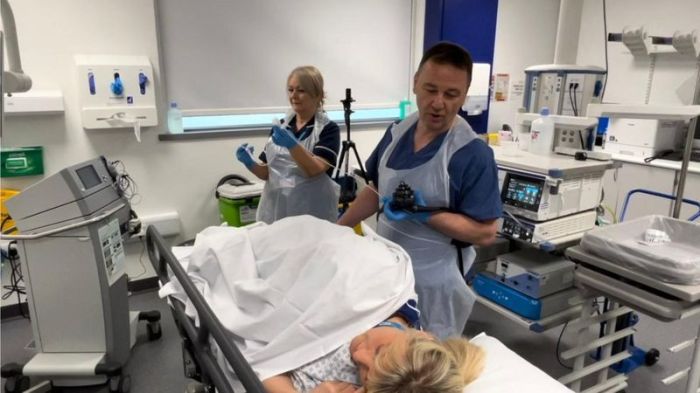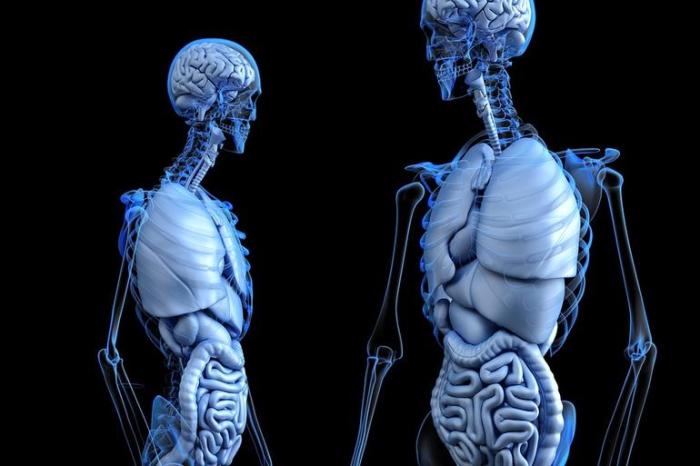AI’s Role in Early Bowel Cancer Detection
Bowel cancer, also known as colorectal cancer, is a serious health concern affecting millions worldwide. Early detection is crucial for successful treatment and improved survival rates. Traditional screening methods, while effective, have limitations that AI is helping to overcome.
Limitations of Traditional Bowel Cancer Screening Methods
Traditional methods like colonoscopy, fecal occult blood testing, and sigmoidoscopy are effective but have limitations. Colonoscopy, the gold standard, requires sedation and can be uncomfortable for patients. Fecal occult blood testing detects blood in stool but may miss early-stage tumors. Sigmoidoscopy only examines the lower part of the colon, potentially missing tumors in the upper part.
AI Algorithms for Early Detection
AI algorithms are revolutionizing bowel cancer screening by analyzing medical images and data to detect early signs of the disease. These algorithms can analyze colonoscopy images, identifying polyps and other abnormalities that may indicate cancer. AI can also analyze data from fecal tests, identifying patterns that suggest a higher risk of cancer.
AI-Powered Tools in Bowel Cancer Screening
Several AI-powered tools are currently used in bowel cancer screening, offering a more efficient and accurate approach. For instance, AI-assisted colonoscopy systems can automatically detect polyps, allowing doctors to focus on areas of concern. AI algorithms can also analyze stool samples, identifying biomarkers associated with cancer risk.
AI-powered tools are proving to be invaluable in early bowel cancer detection, helping to save lives and improve patient outcomes.
The Science Behind AI-Based Detection
AI-powered bowel cancer detection is not magic; it relies on a solid foundation of scientific principles and sophisticated algorithms. The ability of AI to analyze medical images and identify potential signs of cancer is a testament to the power of machine learning and its ability to learn from vast amounts of data.
Types of AI Algorithms
AI algorithms used in bowel cancer detection are primarily based on deep learning, a powerful subset of machine learning. Deep learning algorithms, inspired by the structure and function of the human brain, can learn complex patterns and relationships from large datasets. Here are some common types:
- Convolutional Neural Networks (CNNs): CNNs are particularly adept at analyzing images, making them ideal for medical image analysis. They can extract features from images, such as the shape, texture, and color of polyps, and use these features to classify them as cancerous or benign.
- Recurrent Neural Networks (RNNs): RNNs excel at processing sequential data, such as time series data. In the context of bowel cancer detection, RNNs can be used to analyze the temporal evolution of polyps or other abnormalities over time, potentially aiding in early detection.
Data Sets Used for Training
The success of AI algorithms depends heavily on the quality and quantity of data used for training. Training data for bowel cancer detection typically includes:
- Images from Colonoscopies: These images are the primary source of information for AI algorithms. They provide a visual representation of the colon lining, allowing the algorithms to learn the characteristics of cancerous and non-cancerous polyps.
- Pathology Reports: These reports provide detailed information about the histological features of polyps, including their size, shape, and cellular characteristics. This data helps refine the AI algorithms’ ability to identify subtle differences between cancerous and benign polyps.
- Clinical Data: This data includes patient demographics, medical history, and other relevant information that can help improve the accuracy and reliability of AI-based detection.
Key Features Identified by AI Algorithms
AI algorithms can analyze images and identify key features that distinguish cancerous polyps from benign ones. These features may include:
- Shape and Size: Cancerous polyps often have irregular shapes and larger sizes compared to benign polyps.
- Texture and Color: Cancerous polyps may exhibit a more heterogeneous texture and darker color compared to benign polyps.
- Vascular Patterns: The presence of abnormal blood vessels can be a strong indicator of cancer. AI algorithms can analyze vascular patterns in polyp images to identify potential signs of malignancy.
Accuracy and Reliability of AI Detection
The accuracy and reliability of AI-based bowel cancer detection are critical for its successful implementation in clinical practice. Several studies have explored the performance of AI algorithms in identifying precancerous polyps and cancerous lesions in colonoscopy images. These studies have demonstrated promising results, suggesting that AI can potentially improve the accuracy and efficiency of bowel cancer screening.
Performance of AI Algorithms Compared to Traditional Screening Methods
Numerous studies have compared the performance of AI algorithms to traditional screening methods for bowel cancer detection. The results of these studies have shown that AI algorithms can achieve comparable or even better accuracy than traditional methods. For example, a study published in the journal *Nature Medicine* found that an AI system was able to detect colorectal polyps with an accuracy of 94%, which was significantly higher than the accuracy of human endoscopists (86%).
AI algorithms can potentially improve the accuracy and efficiency of bowel cancer screening.
- AI algorithms can be trained on vast datasets of colonoscopy images, allowing them to learn complex patterns and identify subtle abnormalities that may be missed by human endoscopists.
- AI algorithms can also be used to assist human endoscopists in real-time during colonoscopy procedures, providing them with an additional layer of analysis and potentially improving their accuracy.
Potential for False Positives and False Negatives in AI Detection
While AI algorithms have shown promise in bowel cancer detection, it is important to consider the potential for false positives and false negatives. A false positive occurs when the AI algorithm identifies a polyp or lesion that is not actually cancerous, while a false negative occurs when the algorithm fails to detect a cancerous polyp or lesion.
The potential for false positives and false negatives is a critical consideration in the development and implementation of AI-based bowel cancer detection systems.
- False positives can lead to unnecessary biopsies and anxiety for patients.
- False negatives can delay diagnosis and treatment, potentially leading to worse outcomes.
The Impact on Patient Care: Ai Detect Bowel Cancer Less Than A Second
The potential of AI in bowel cancer detection extends far beyond simply speeding up the diagnostic process. It promises to revolutionize patient care by enabling earlier diagnosis, leading to more effective treatment and potentially improving overall survival rates.
The ability of AI to analyze large datasets of medical images and identify subtle patterns that might be missed by the human eye allows for the detection of cancer at its earliest stages, when treatment is most likely to be successful. This early detection can significantly improve patient outcomes.
Earlier Diagnosis and Treatment
Early diagnosis is crucial in the fight against bowel cancer. The earlier the cancer is detected, the higher the chances of successful treatment and long-term survival. AI-powered detection systems can help achieve this by:
- Identifying precancerous polyps: AI algorithms can analyze colonoscopy images and identify precancerous polyps that might be missed by human observation. This allows for timely removal of these polyps, preventing them from developing into full-blown cancer.
- Detecting cancer in its early stages: AI can detect subtle changes in tissue structure and identify early signs of cancer that may not be visible to the naked eye. This allows for earlier diagnosis and treatment, increasing the likelihood of a positive outcome.
- Improving screening accuracy: AI can be used to improve the accuracy of screening tests, such as fecal occult blood tests (FOBTs), which are used to detect blood in the stool, a potential sign of bowel cancer. This can help identify individuals at risk of developing cancer who might otherwise be missed.
Ethical Considerations, Ai detect bowel cancer less than a second
While the potential benefits of AI in bowel cancer detection are significant, it is important to consider the ethical implications of its use in healthcare.
- Data privacy and security: AI algorithms require access to large amounts of patient data, raising concerns about data privacy and security. It is essential to ensure that patient data is collected, stored, and used responsibly and ethically.
- Bias and fairness: AI algorithms are trained on data, and if the data is biased, the algorithm may produce biased results. This could lead to disparities in healthcare access and outcomes for different patient groups. It is crucial to ensure that AI algorithms are trained on diverse datasets and are free from bias.
- Transparency and accountability: It is important to ensure transparency in the development and deployment of AI systems in healthcare. This includes understanding how the algorithms work, how they are being used, and who is accountable for their decisions.
The Future of AI in Bowel Cancer Screening
The potential of AI in bowel cancer screening is undeniable, but it’s crucial to understand the challenges and limitations that lie ahead. While AI holds immense promise, ongoing research and development are necessary to refine and optimize its role in this critical area of healthcare.
Potential Challenges and Limitations
Despite the remarkable advancements in AI-based bowel cancer detection, there are certain challenges and limitations that need to be addressed.
- Data Bias: AI models are trained on existing data, which can reflect biases present in the healthcare system. This can lead to inaccurate predictions for certain patient groups, potentially impacting equitable access to care.
- Explainability: While AI can provide accurate diagnoses, understanding the reasoning behind its decisions can be difficult. This lack of transparency can hinder trust and acceptance among healthcare professionals and patients.
- Integration with Existing Systems: Integrating AI-powered tools into existing healthcare workflows can be complex and time-consuming, requiring significant infrastructure changes and training for healthcare professionals.
- Ethical Considerations: The use of AI in healthcare raises ethical concerns, including data privacy, patient autonomy, and potential job displacement for healthcare professionals.
Ongoing Research and Development
Researchers and developers are actively working to overcome these challenges and enhance the capabilities of AI in bowel cancer screening.
- Improved Data Sets: Efforts are underway to create larger and more diverse datasets, including data from underrepresented patient populations, to mitigate bias in AI models.
- Explainable AI: Researchers are developing techniques to make AI decisions more transparent and understandable, enhancing trust and accountability.
- Human-AI Collaboration: Research focuses on developing AI systems that complement human expertise, enabling collaborative decision-making in clinical settings.
- Ethical Guidelines: The development of ethical guidelines and frameworks for AI in healthcare is crucial to ensure responsible and equitable use of these technologies.
Predictions for the Future
AI is poised to play a transformative role in bowel cancer screening, improving early detection, diagnosis, and treatment.
- Personalized Screening: AI-powered tools could personalize screening recommendations based on individual risk factors, leading to more targeted and effective screening strategies.
- Enhanced Accuracy: Ongoing research and development will continue to improve the accuracy and reliability of AI-based detection, enabling earlier and more precise diagnoses.
- Improved Access to Care: AI-powered tools could expand access to bowel cancer screening, especially in underserved areas, by automating tasks and streamlining processes.
- New Treatment Strategies: AI could contribute to the development of new and personalized treatment strategies based on individual patient characteristics and tumor profiles.
Ai detect bowel cancer less than a second – The emergence of AI in bowel cancer detection is a testament to the transformative power of technology in healthcare. As AI continues to evolve, we can expect even more sophisticated and accurate screening methods, ultimately leading to a future where bowel cancer is diagnosed and treated at its earliest stages. This progress holds immense promise for saving lives and improving the quality of life for millions of people worldwide.
While AI can detect bowel cancer in less than a second, some tech advancements take a little longer. The commercial release of the Oculus Rift, which was initially slated for this year , has been pushed back. But hey, at least we’re getting closer to that super-fast cancer detection, right? Maybe we’ll have both by next year!
 Standi Techno News
Standi Techno News

